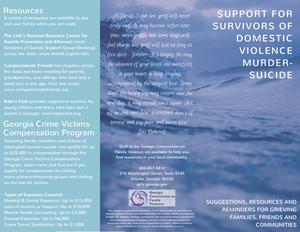Resources
A variety of resources are available to you and your family when you are ready.
The Link's National Resource Center for Suicide Prevention and Aftercare hosts Survivors of Suicide Support Group Meetings across the state: www.thelink.org/nrc.htm
Compassionate Friends has chapters across the state and hosts meeting for parents, grandparents, and siblings who have lost a loved one at any age, from any cause: www.compassionatefriends.org
Kate's Club provides supportive services for young children and teens who have lost a parent in Georgia: www.katesclub.org
Georgia Crime Victims Compensation Program
Surviving family members and victims of attempted murder-suicide may qualify for up to $25,000 in compensation through the Georgia Crime Victims Compensation Program. Learn more and find out if you qualify for compensation by visiting www.crimevictimscomp.ga.gov and clicking on the link for victims.
Types of Expenses Covered Medical & Dental Expenses: Up to $15,000 Loss of Income or Support: Up to $10,000 Mental Health Counseling: Up to $3,000 Funeral Expenses: Up to $6,000 Crime Scene Sanitization: Up to $1,000
"As far as I can see, grief will never truly end. It may become softer over time, more gentle, but some days will feel sharp, but grief will last as long as love does-- forever. It's simply the way the absence of your loved one manifests
in your heart: a deep longing, accompanied by the deepest love. Some days, the heavy fog may return, and the next day, it may recede, once again. It's all an ebb and flow, a constant dance of sorrow and joy, pain and sweet love."
-Lexi Behrndt
Staff at the Georgia Commission on Family Violence are available to help you find resources in your local community.
404-657-3412 270 Washington Street, Suite 5145
Atlanta, Georgia 30334 gcfv.georgia.gov
This project is supported by Award No. C15-8-339 awarded by the Office on Violence Against Women and administered by the Criminal Justice Coordinating Council. The opinions, findings, conclusions, and recommendations expressed in
this publication/program/exhibition are those of the author(s) and do not necessarily reflect the views of the Department of Justice, Office on Violence
Against Women or the Criminal Justice Coordinating Council.
SUPPORT FOR SURVIVORS OF
DOMESTIC VIOLENCE MURDER-
SUICIDE
SUGGESTIONS, RESOURCES AND REMINDERS FOR GRIEVING FAMILIES, FRIENDS AND COMMUNITIES
About Murder-Suicide
A domestic violence murder-suicide occurs when a person kills one or more victims, including a current or former intimate partner, and then commits suicide. Most domestic violence murder-suicides occur in the home, and sometimes children are present or are witness to the death(s) of their parent(s).
Every year in Georgia, there are an average of 20 domestic violence murdersuicides, leaving behind hundreds of family members and friends.
A murder-suicide can shatter the equilibrium in your life. Losing a loved one, particularly in a sudden and violent manner, can be traumatic. For many, losing two loved ones at the same time in such a manner can exacerbate and complicate the grieving process.
What Happens Next
Following a murder-suicide, families and friends may be confronted with several situations which they may find overwhelming. You may be asked to speak with law enforcement, identify the bodies of the deceased, talk with the media, visit the crime scene, arrange for the crime scene to be cleaned, prepare for the funeral(s), claim the personal effects of the deceased, and handle their estate.
Grief: What to Expect
Expect a range of emotional, physical, and behavioral changes in the aftermath of a murder-suicide. All of these are normal reactions after losing someone you love. Emotional Impact: Shock, numbness, anger, fear, anxiety, guilt, shame, and pain Physical Symptoms: Rapid heart rate, shortness of breath, headaches, body aches, loss or increase of appetite, and extreme fluctuations in crying Behavioral Changes: Avoiding the subject of death, poor concentration and memory, intrusive thoughts, difficultly sleeping, and hyper-vigilance
Stages of Grief
Adapted from Kbler-Ross
Healing Considerations
Allow yourself to express your emotions. Confide in trusted individuals. Tell the story of your loss. Seek help from a counselor or faith leader. Groups addressing grief and unexpected loss may provide an opportunity to talk with others who have shared a similar experience.
If you are not ready to seek help from a counselor or support group now, familiarize yourself with what resources are available for when you are ready, or for when you may need support and resources for your family members and friends.
Find ways to connect to your lost loved one by keeping a journal and writing to them. Carry an object linked to the person who died. Create a memory area in your home.
Take care of yourself. Get plenty of rest, incorporate exercise you enjoy, and eat well. Develop nighttime routines to help you sleep. Allow yourself some time alone.
Do something to help others. This may allow you to step outside of your own pain for a while and find comfort in acts of service in your community.
Give yourself time; there is no time limit on grieving. Do not be afraid to reach out for help, even if years have passed.
